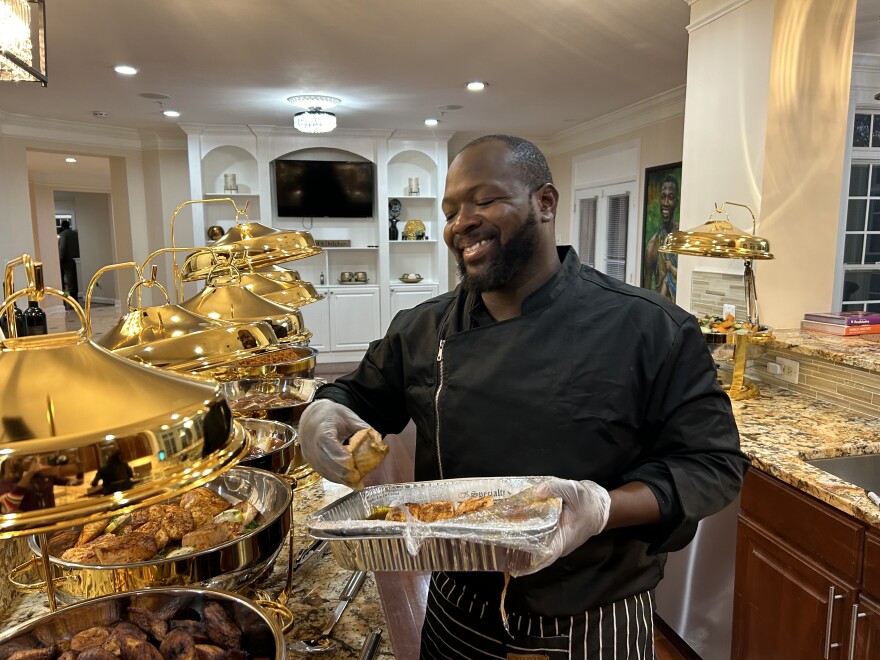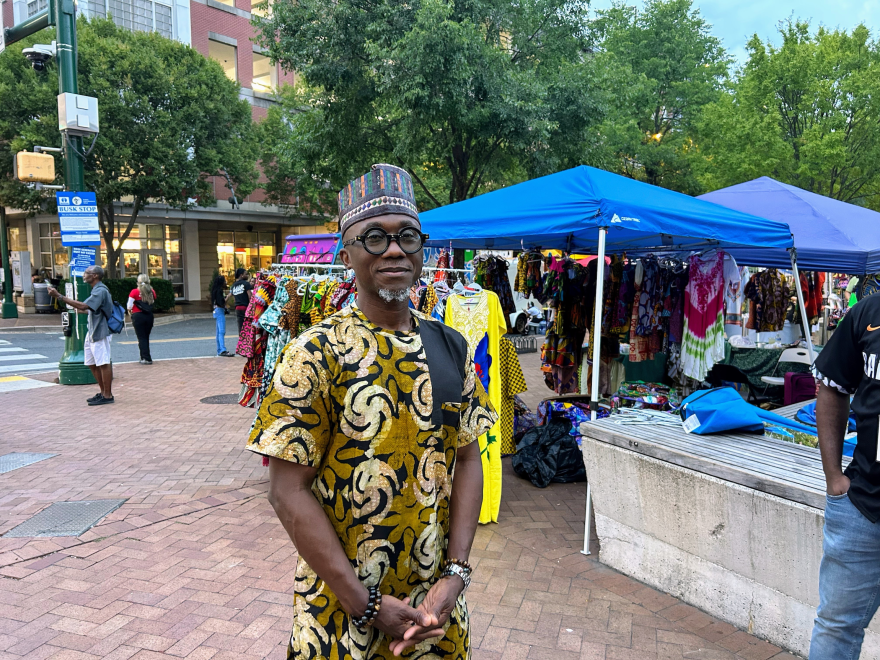According to the Institute for Immigration Research (IIR), African immigrants represent 17% of the state’s immigrant population. Often overlooked, this community of about 900,000 people has begun organizing and demanding more political representation.
In its research, the IIR found that Maryland has the fourth highest population of African immigrants. California, New York and Texas have higher populations according to migration policy experts.
At a recent fundraiser in a Bowie mansion, the fusion of two cultures was on full display. Afrobeat music filled the air as guests enjoyed a mix of traditional American fare and Nigerian cuisine, including plantains and jollof rice.
“I’m blending the two cultures in a pretty and tasty way,” said Chef Michel Odukoya as he garnished the food.

While some wore western attire, others like Victor Ogbonna– a self-identified Igbo Chief — proudly donned cultural outfits. He explained that his headpiece, made with real feathers, was “not a hat, but a crown.”
For this royal affair, guests paid a $500 entry fee in honor of Baltimore’s Mayor Brandon Scott, a Democrat seeking a second term. “It means a lot to me to have this supportive relationship,” said Scott. “There's been so much effort, time and money spent dividing those of us who were born here versus those who are coming from the motherland. And to have this support warms my heart.”
According to the Baltimore Police Department’s mid-year crime report, the city has seen a 36% decrease in homicides and a 30% decrease in non-fatal shootings. Ifeoma Onyia, a co-host of the fundraiser, said that was one reason for backing the mayor. As the owner of a mental health clinic, Onyia, credited the mayor’s public safety policies for this improvement.
“It's nice for me to talk to my clients and say, ‘Was there any shooting outside today?’ And they're like, ‘Oh no, we're able to walk down the street, Miss Ifeoma.’”
Beyond public safety, Onyia and other African immigrants want greater representation. They are calling for cultural awareness, educational support, and broader community engagement to address the specific needs of Africans.
Many jurisdictions have established commissions on African affairs, and the attendees of the fundraiser hope that Mayor Scott will create one in Baltimore, as well. Though Continental Africans who have settled in the region are not a monolith, the Democratic Party has begun targeting this emerging voting bloc.
Luca Amayo, a communications specialist with the Maryland Democratic Party, said efforts include establishing diversity leadership councils, hiring an organizer to focus on the Black Diaspora, and training politically active individuals to reach out through “friendbanking”—phone banking to people already in one’s network.
Despite these efforts, Amayo noted that the party lacks clear data on this non-traditional voting bloc.
“The data can be obscure about immigrant participation in the electoral process,” Amayo said. “First-generation immigrants are often grouped under the general ‘Black’ category. There’s no clear delineation of the African community.”

While the party refines its data, one African community leader is betting on his own outreach efforts. Chukwunonso “Vincent” Iweanoge, chairs the Governor’s Commission on African Affairs. He is leading an apolitical campaign aimed at reaching eligible African voters at religious centers.
“If you don’t vote, you cannot complain about the laws and decisions that are made on your behalf,” Iweanoge told congregants at a mosque in Lanham. But his outreach hasn’t been without challenges.
“There is a mistrust with politicians,” said Haja Dumbuya, a leader at the Islamic center. “That's the big problem. Talking is one thing. You can’t just come and say, ‘vote.’ Why am I voting? What are my needs? Who will I vote for?”
Iweanoge is undeterred.
He agreed that outreach must be paired with education. Looking to the future, he believes this demographic will play an influential role in shaping Maryland politics.
“That's why we're here — to keep talking,” Iweanoge said. “There's a famous African adage that says, if you want to go fast, go alone. If you want to go far, go with others’. In our community, we move together. We're very communal people.”










